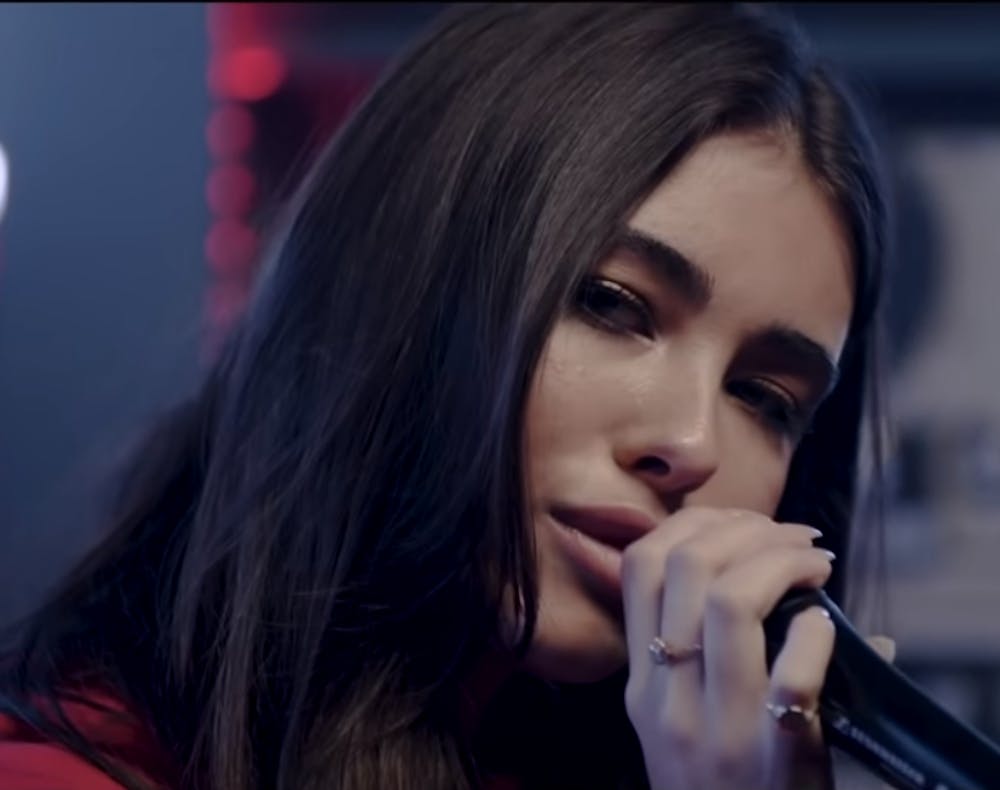Last week, Madison Beer released her debut album Life Support. This album was Beer’s response to years of turmoil: being dropped by her label and diagnosed with borderline personality disorder as many of her personal relationships suffered, all while facing constant scrutiny as a teenage star on social media.
Her album is a deeply personal reflection on how these experiences shaped her and who she is becoming. There are 17 tracks, though I did feel that many were on the shorter side, with the entire album clocking in at only 46 minutes.
“The Beginning,” though wordless, effectively establishes the tone for the rest of the album. Beer’s voice, breathy at first, quickly gains strength in a show of ethereal power. The layering of her voice is a common sound throughout the rest of her songs.
The first song, “Good in Goodbye,” falls solidly into the genre of pop. It might be one of the songs on the album that is the easiest to sing along to. However, if you take a close listen, Beer’s incredible vocal control becomes apparent — it’d be difficult to pull off those vibrato flourishes on any karaoke night.
The song’s also a catchy break-up song that literally spells it out: “You put the over in lover, put the ex in next... I ain’t even gotta try to find the G-O-O-D in goodbye.” Though a polarizing technique in songwriting, I find it admirable that Beer is able to break the words down and successfully build them back up again to fit her narrative; these kinds of details tend to get lost in everyday language.
She employs a similar method that makes her words more digestible and memorable by counting down in “Emotional Bruises,” one of the later tracks and one of the break-up songs on the album: “This is the fifth time I’ve taken you back / It’s the fourth time that we’ve relapsed / It’s the third second chance that I’ve given you / For the first time, let this be the last.”
The next song is a short one. “Default” reminds me a bit of Kesha’s “Praying” in terms of the sound, as well as the significance that the song holds for Beer, given that she unveils her struggles and makes a grand comeback with this album. However, “Default” seems to also be a message primarily directed at her listeners.
“If you’re hearing this, I hope that you’re proud / Can’t even count how many times I let you down,” she sings.
Throughout Life Support, Beer’s maturity plays well with her youth. She offers insight into her mental health struggles with “Effortlessly” and “Stained Glass.” And frankly, if you listen to nothing else from this album, I highly recommend listening to “Stained Glass”; it definitely had an impact on me and may have one on you. Her message is so important and powerful: “My skin is made of glass / But apparently it’s stained / ‘Cause you notice all the cracks / But can’t look inside my pain.”
The song is a reminder to be kind as we interact with the world and to be empathetic because everybody has their own struggles. In some cases, our struggles are clearly visible, but in most, they are hidden, and they are both a coveted privilege and an overlooked problem.
In “Blue,” Beer channels Lana Del Rey, and it’s so well-executed. I think it speaks to Beer’s versatility that she is able to adopt various styles, from synth to soft, for her story. As a young artist finally with the creative freedom to express herself in the ways she wants — Beer co-wrote and co-produced the entire album — she’s drawing on music she loves, music that has become integrated into her own identity, to make her own for other people to love.
Another note on “Blue,” which also applies to a few of the other songs on Life Support, is that Beer sounds shockingly emotional. Of course, music is inherently emotional. But even so, it’s rare to hear such raw imperfection outside of Broadway (the only comparable instance I can think of is Olivia Rodrigo’s “drivers license,” which is everywhere on TikTok, and we all know what a success that song is).
Moving on, let’s talk about my favorite song on the album: “Homesick.” I’d already decided it was my favorite song out of everything I had heard so far before the song reached its end, but then the song reached its end. And it’s hilarious.
The only past experience I have with Rick and Morty was a classmate’s final presentation in AP English Literature at the close of my junior year in high school. I don’t remember much except that I laughed a lot. This song’s clip from the show has the same inexplicable effect every single time.
The final song on the album is “Everything Happens for a Reason.” This is another song that holds a universal message. Accompanied by instrumentals that evoke an era long past, Beer sings in a tighter, more naive voice, “I used to believe / That everything happens for a reason / But I just can’t find a reason.” I think this is something we all struggle with coming of age and regarding certain people’s actions during the pandemic.
“Channel Surfing / The End” ties the whole album together in a tender way. It is what it sounds like, and the clip of Beer singing “Dear Society” — a single released independently by Beer after she parted with her old label and before she officially signed with her new one — really made me smile.
Overall, Life Support is a comfort. I didn’t mention every song, but I do recommend experiencing the whole album. Listening to it is a way to enter Beer’s world as much as it is holding up a mirror for us to take a fearlessly nonjudgmental look at our own. Beer’s honesty with herself and with the world encourages reciprocal honesty. It’s brilliant.





